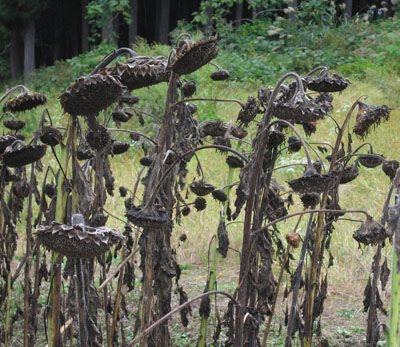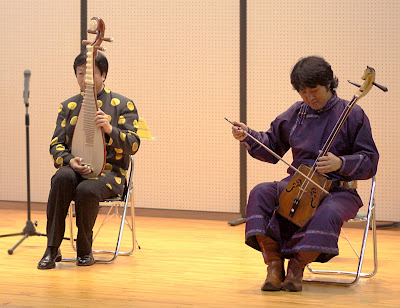The rice is in, the weather is patchy, and snow is coming in a month or two. It is time to prepare with an attention to detail commensurate with the scale of the coming problem, and that is considerable. A metre can fall in one day, and Aizu has one of the heaviest snow-falls in Japan. But people have time. The eighty eight actions it takes to produce rice have been accomplished, and it has been a good year - wetter than usual, but dry for the important two weeks needed to ripen the grain after it had formed. There is a relaxed relief in the air, people smile and laugh even more now that the rice, that most central foundation of life, is secure and in store.
Piles of rice husks are everywhere, to be used in their turn for many things
The cycle of seasonal crops continues to the death of the year, growing and drying, preparing and hoarding, squirrelling away for the hungry months to come. Old habits, ancient habits, die hard, and who doesn't feel better with groaning cupboards when the storm howls outside? So we all have cars, the roads are ploughed, the Co-op delivers and the internet brings all to our door. Is that any reason to get lazy? We remember real hunger, and that is not a game. And who can make food like our food? Everyone knows that ours are the best rice, the best beans, the best vegetables - the supermarkets are full of stuff from China. Who knows what they put in it over there? When everything on your table comes from your own hand, you know where you are.
Husband and wife digging the good stuff from the ground: sweet potatoes
Marching stooks and tripods of grass on stubble or bare earth push back the green to outposts of winter cabbages and leeks. Each village has it's own pattern, it's own way of doing this, some in fat bundles, others stacked around trees, still more in ingenious arrangements all tied up with themselves like POW s on role call.
People love their gardens too, and protect their shrubs and trees before their houses. Yet another use for the indispensable long pine poles is to create wooden spires above each one. They pin the snow in place and keep it from slumping onto the beloved with crushing indifference, a careless wrestler flopping his vast white belly down to sleep. Later we can make sure the house is OK.
They say that the Kusai-mushi ('stink bugs'), that clamour for re-admittance to the same houses they left in the spring, know when it is going to be heavier winter snow than usual. The more there are, the heavier will be the fall. They only want the same as us, to be buried under a pile of futons and blankets, pooling our heat, huddled together under a safe roof to wait it out. The same beetles that flicked and scuttled at speed in the spring sun, evading the stabbing chop-sticks of their human hunters, to live a life green in the woods, now stagger slowly, befuddled and old, heading for any nook or cranny that will have them, and are easy prey. We don't want to share our winter quarters with them, picking them out of our socks and underwear, hopefully before putting them on....Though I suppose to them we don't smell too good either.
Late October, and it is the turn of soya beans to be dried
•••••••••••••••••••••••••••





















































